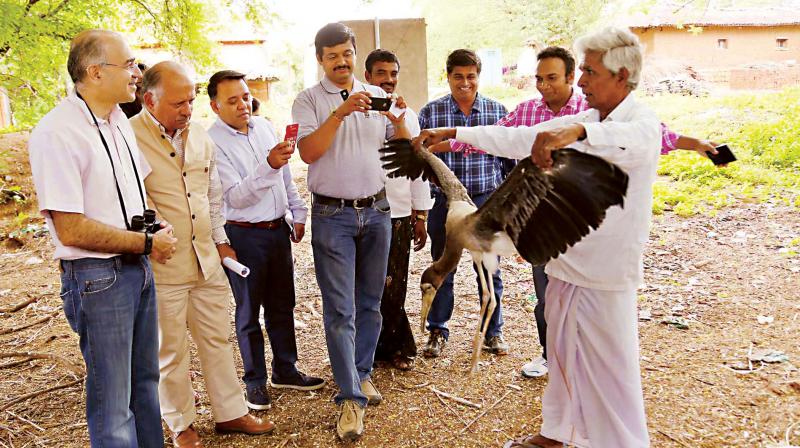At Kokkarebellur, birds are their children
Folklore says that girls are married off to only those households whose backyards are often visited by birds.

Bengaluru: It’s a rare sight to witness a symbiotic relationship between man and wildlife. Kokkarebellur, located 80 kms from Bengaluru is named after a painted stork called kokkare in the Kannada language. Folklore says that girls are married off to only those households whose backyards are often visited by birds. In 2006, the village was declared as an ‘Important Bird’ area.
B Linge Gowda, who runs a rescue centre for birds highlights that agriculture in the village has flourished due to the use of manure prepared from bird droppings (guano). “People look after birds like their own children. At a young age, children are taught not to disturb their habitat. A healthy eco-system is a gift we should leave for our future generation,” says Gowda.
Gowda is associated with Hejjarle Balega, a group formed in 1994, to protect the habitat of the pelicans. “Unlike cities where people live in multi-storied houses, we live beneath and let the birds build their habitat on top,” adds Gowda.
Witnessing the passion of the community members of the village, the state government recently insulated electric cables in the village, at a cost of Rs 45 lakh. This has helped protect birds from electrocution.
M.N. Harish, Deputy Director, Department of Tourism Karnataka says, “Seeing the dedication of locals in conserving wetlands and bird’s habitat, the government undertook initiatives such as the construction of roads, drainage pipes and insulation of electric cables.
On Friday, WWF (World Wide Fund for Nature) in partnership with a privately owned bank launched the revamped interpretation centre at Kokkarebellur. The interpretation centre aims to highlight the symbiotic relationship between the residents of the village with the birds, which is a step forward towards developing a sustainable community-centric eco-tourism model. Apart from preparing a revenue model for the community centre at the village, WWF wants to disseminate the efforts of the community centre to an entire country.
Lakshi Swamy, President of the Gram Panchayat, Kokkarebellur is excited about the village becoming a hub for eco-tourism. She credits WWF for the rejuvenation of nearly seven tanks in the village.
Viewed as harbingers of good fortune, the people of Kokkarebellur do not harvest tamarind pods during the nesting season. In order to protect tamarind trees, which the birds prefer for nesting, the forest department offers a compensation of Rs 500-2,500 per tree. Recently, a banyan tree was saved from being axed after forest officials convinced the owner of the house about the importance of birds nesting on such trees.
Siddaraju, a drawing teacher at Government High School, Kokkarebellur, teaches school children about the importance of sustainable development through regular sessions of quiz and drawing competitions. Most of the children of the school also work as tour guides. “Since the ground water has receded due to increasing population, we also train the children on how to conserve water bodies,” adds Siddaraju.

